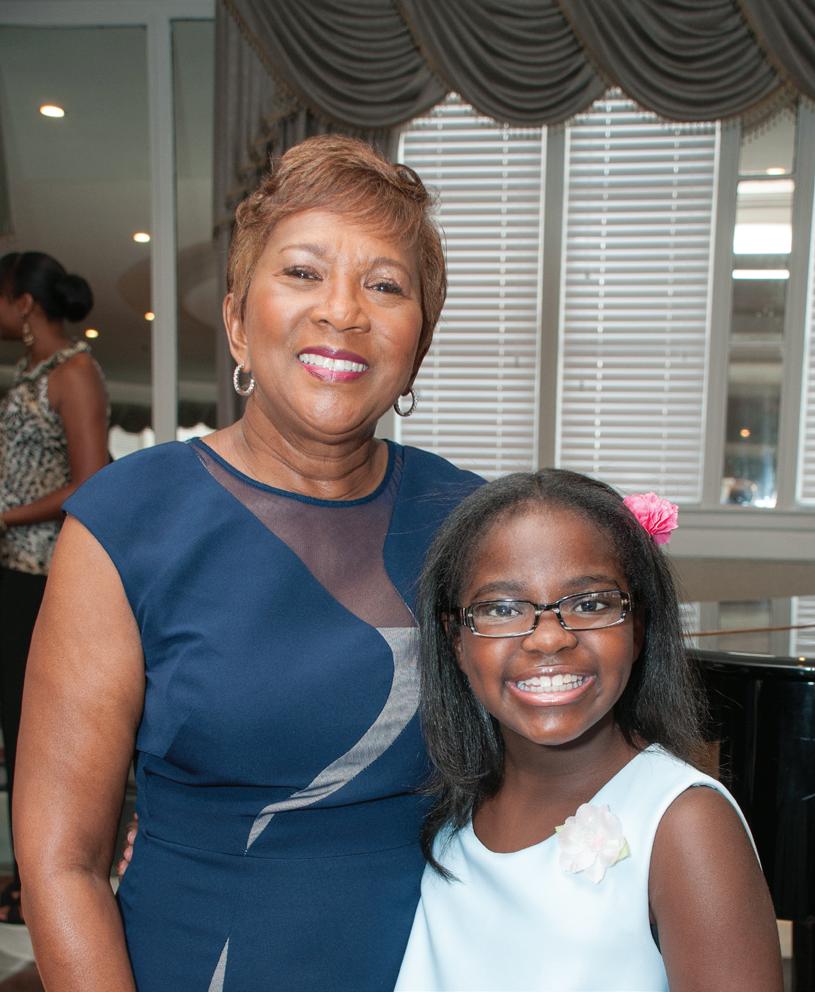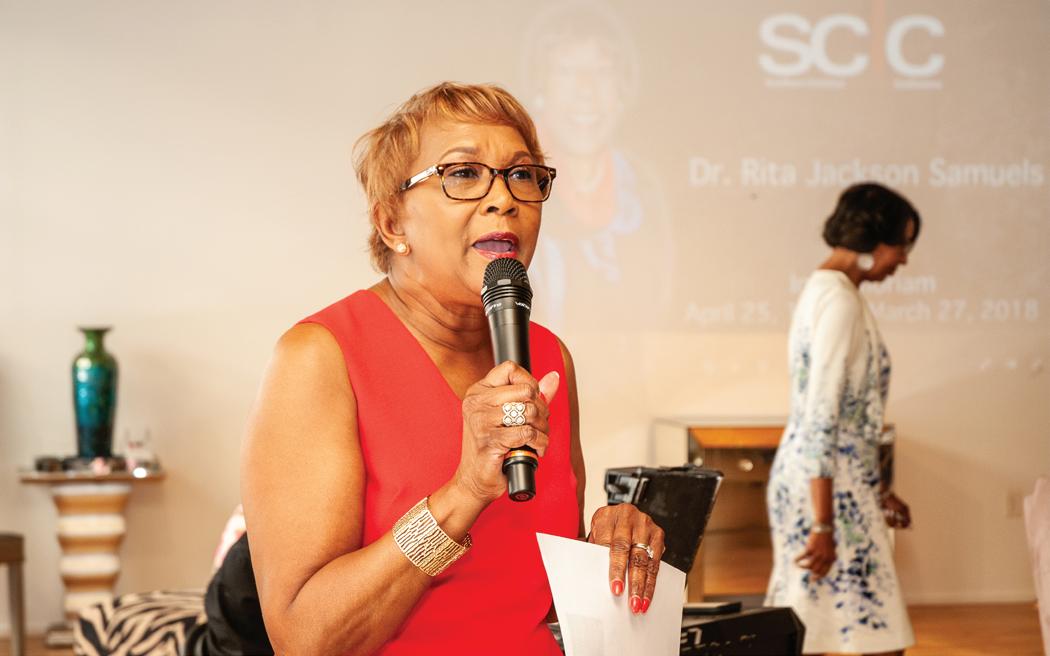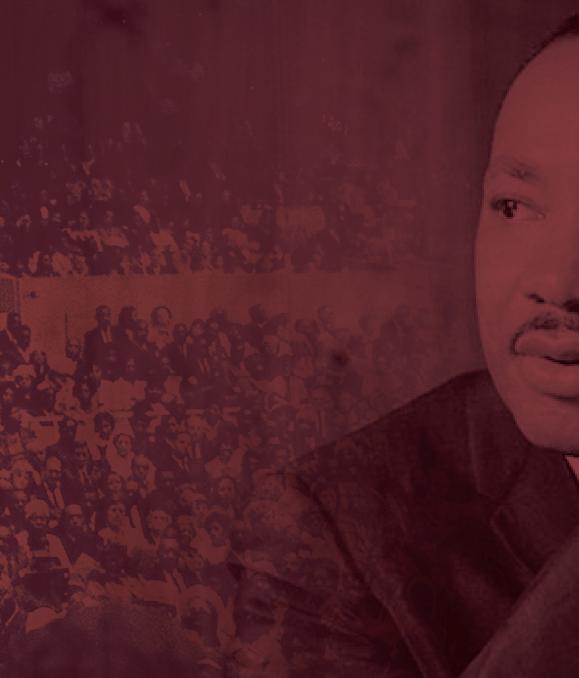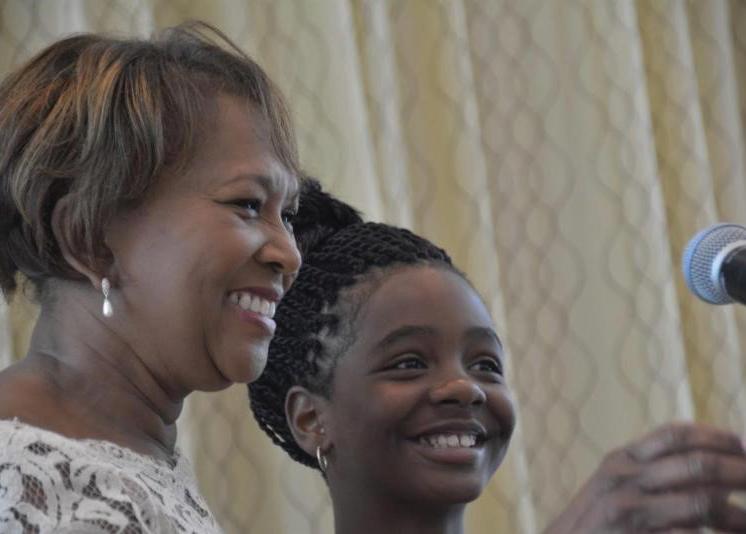
11 minute read
Cathelean Steele: Living a Life of Courage & Hope
CATHELEAN STEELE: LIVING A LIFE OF COURAGE AND HOPE
Debbie Ellison, Executive Director of Global Humanitarians Unite
The brave little girl who integrated two schools and rose above hatred grew into the woman who continues to fight racism and leave a better world for young people. It is this kind of courage and the longing to do what’s right that has carried Cathelean Steele through life.
She was an educator in Alabama for more than 25 years. Today she is the national program director and event coordinator for the Southern Christian Leadership Conference (SCLC) and wife of the SCLC national president/CEO, Dr. Charles Steele Jr. She has also been the Coordinator for the National SCLC Conference for the past ten years and is the founder of Justice for Girls, a sex trafficking prevention initiative. Born in 1951 in Eutaw, Alabama, she was the oldest of nine children. She says her father was a great follower of Dr. Martin Luther King Jr. and believed that integrating the schools would make a big difference. And since she was the oldest child in her family, he chose her to integrate.
She and her cousin integrated Eutaw High School in Eutaw her first semester of her freshman year. “My cousin and I were the only two Blacks on the bus,” she remembers. “We were called names and had spitballs thrown at us. I lived with my grandparents the first semester. The second semester, I moved to Montgomery with my parents. When I moved to Montgomery, I was excited because I thought, I won’t have to integrate again. My father made me do it again.
“I said, ‘Daddy, what school am I going to attend? Am I going to attend Carver High School?’ He said, ‘No, you’re going to integrate Sidney Lanier High School.’ ” When she was in the sixth grade, Dr. King visited a church in Eutaw. “And my daddy took me out of school so that I could meet Dr. King. We could not go into the church because it was packed. So my father said, ‘We’re going to stand outside in the parking lot across the street because when Dr. King finishes his sermon, he’s going to come outside and shake everyone’s hand.’ And sure enough, he came out and across the street, and I got a chance to shake his hand.”

She says, “I think my father would be sad if he was alive now to see that all the schools that were integrated are now segregated again. So all we went through to integrate schools, now they’re segregated again.”
She remembers several racist incidents she experienced in high school which she believes taught her to be strong.
“When Dr. King was assassinated, we had a semiriot at school. They had to call in the police. And it happened because the African-American ROTC students lowered the flag at the school to half-mast because of Dr. King’s death. And, of course, that caused a big problem.”
She recalls sitting at a Lanier High School football game when a white student who lived on the street she lived on touched her on the shoulder. “I looked back, and he said, hi, and I said hi. And they beat him up so bad for speaking to me that he had to be hospitalized. And I never saw him again. I don’t know if his family just pulled him out of the school. I don’t know what happened.”
She says some of her classmates “called me nigger a couple of times, and I had a football thrown at me. But it was just part of what we had to do.” She has proved to be a positive influence on and prized partner to her husband, SCLC President Dr. Charles Steele Jr. “He has done some amazing things. I tried to encourage him to continue to do the work that he believes in and to be there in any way that he needs me. Regardless of how difficult it is, I have to be there for him.” She says she encouraged him to run for the Tuscaloosa City Council, and he became one of the first Black City Councilmen in Tuscaloosa. When he was the local SCLC president, she told him he needed to start traveling the world to learn how the Civil Rights Movement has impacted the rest of the world. Since then, he has been to more than thirteen countries, and she has traveled to many countries with him.
“His first trip to Africa was with Dr. Joseph Lowry. And I encouraged him to go to Germany with Mikhail Gorbachev.” She recommended him to be the national president of SCLC. He was offered and took the job after serving as SCLC vice president and a state senator.
She calls her husband an equal opportunity protester. “He didn’t just protest for the rights of Blacks. He protested for the rights of whites as well. If there was an issue, it didn’t matter to him whether the person in the middle of the issue was Black or white.
What mattered to him was whether the issue was the right issue for that persecuted person. He was locked up once for protesting for a white lady that was being mistreated on her job. So they were protesting in front of the store where she worked. And he was arrested for that. He was constantly being arrested.“
Even though the racist incidents she endured were difficult at the time, she sees them as “lessons learned.” And she says it prepared her to marry her husband “because I had no idea about civil rights. But we got through it.”
“I remember one incident that was pretty bad. He and this group locked themselves in the Board of Education. I was with my in-laws. One neighbor was an 84-year-old white lady, and she loved me. One day she called me and said, ‘You need to come home.’ When I got home, the police and fire department were there. Someone had poured gasoline on the front yard, and the fire had burned all the way to the hedges. They never found who did it, and I never heard anything about it again, no police report, nothing. My father-in-law wouldn’t let me stay at home after that. So, I stayed with my in-laws until Charles was back.” Her friend, American civil rights leader and broadcasting executive Xernona Clayton, says, “Mrs. Cathelean Steele is one of the kindest persons that I have had the pleasure of meeting, knowing, and loving. She is obviously dedicated and committed to equity and justice for our nation. She has organized women and young girls to improve their skills and talents to navigate and escalate their opportunities in our country. I am an immense admirer of Mrs. Steele.”

Steele says she loves teaching Black history because “kids need to know their history in order to appreciate themselves. And I think that’s what’s wrong with our kids these days. They don’t know their history. They don’t know where their families came from. I think life would be better for them if they just knew. “Mamie Till Mobley came to the school and spoke with my class.” Mrs. Mobley was one of her friends and the mother of Emmett Till, a 14-year-old African American who was brutally beaten and lynched in Mississippi in 1955 after being accused of offending a white woman, Carolyn Bryant.
“She didn’t want Emmett to go to Mississippi. She really did not find out what happened to Emmett until years after Emmett died. She knew he had been brutally murdered, but she really didn’t know what led up to it. She said she knew Emmett whistled, but she said he only whistled because he stuttered. And she had taught him when he got ready to say a word, if he couldn’t get it out to stop and whistle. So for years, she thought he may have whistled trying to talk to Mrs. Bryant.”
Her advice to youth…”Regardless of what anyone says about you, you need to know yourself, and I’m telling you, you are valuable. And it doesn’t matter what anybody else says about you. It’s how you feel about yourself. You have to love yourself, have self-worth. You can’t listen to outsiders…You can’t tell me that I’m not worthy. I know that I’m worthy. So we just can’t let anyone else defi ne who we are.” Steele is the recipient of many awards and the author of Justice For Girls Curriculum and Smarty Arty, a children’s book. She is the mother of two daughters, LeKeisha and Charla, and the proud grandmother of Carson, Cruz, and Harper Grace and Paige.
She has been through a lot of challenges in her life, yet she remains hopeful and loving. She says she is most proud of her daughters, her husband, and everything she has been through. “I think I handled it well. I haven’t handled it with animosity. It was just something at the time, I think it had to be done. And so, who am I to say that I shouldn’t have been the one to do it? It’s a waste of energy to be angry and bitter. It drains you of your potential.
“I think that my philosophy of life is to live, learn, teach, so that we can leave something for the next generation. What comes, we hope for the best. I just have to live my best life.” And she has done just that, leaving for the next generation her legacy of hope and courage to do the right thing even though it may not be the easy thing.

Southern Farm Bureau Casualty Insurance Company
Remembering His Life and Legacy
Rev. Dr. Martin Luther King Jr (1929-1968)

morehouse.edu/kingcollection

Prevent Sex Trafficking

An iniiaive of the Southern Chrisian Leadership Conference SCLC developed as an educaional awareness project aimed at highlighing the alarming growth of sex trafficking in our communiies.


A pracical guide of interacive lessons designed to increase the sense of value and worth of girls 5-18 thereby reducing the risk of commerical sexual exploitaion.


By Maynard Eaton, Executive Editor
It was a sudden brainstorm following her first brain surgery when SCLC’s First Lady, Cathelean Steele, cleverly created Justice For Girls, a National SCLC program she devised to rescue “at risk” young women from the lure of sex trafficking and other illicit lifestyle activities and a passion she has pursued and nurtured ever since.
“I just happened to pick up this magazine that had an article about sex trafficking,” recalls the former classroom teacher and mother of two girls. “And when I started reading it, I guess I was just immune to the fact that so many young girls were being trafficked and so many girls were being kidnapped from their families, and actually walking the streets.”

Once First Lady Steele recuperated and returned to her SCLC office, she went to work educating parents and teachers about sex trafficking and introducing young women to the world outside of their communities. That was a decade ago.
“A lot of the girls told me, ‘Well, we’ve never been to the King Center,’ Mrs. Steele remembers. “You live right here in Atlanta, and you’ve never been to the King Center? They said, ‘I’ve never been downtown.’ And I realized they really needed exposure, and that was one-way kids were being kidnapped and people were promising them things and they had not been exposed to. So, that is when we started taking them hiking and taking them on college tours and various museums just so that they could see there is life outside of where they live, where they go to school, their surroundings. I guess kind of a companion piece to teaching them about sex trafficking.” A retired public-school teacher who achieved special recognition for her innovative history teaching approaches in the State of Alabama, First Lady Cathelean Steele has a passion for mentoring young women — and standing for their future — that simply will not quit. “When I was teaching, field trips were one of the things that I did with my students,” the revered educator tells me. “I would always take them on a field trip, whether it was to the state capital to see what was happening, and see how the government was run, or whether it was to Memphis, Tennessee, to where Dr. King was assassinated or whatever. Yes, the education played a part in it, the fact that I was a teacher played a part in my deciding to educate the kids on sex trafficking and to expose them.”









